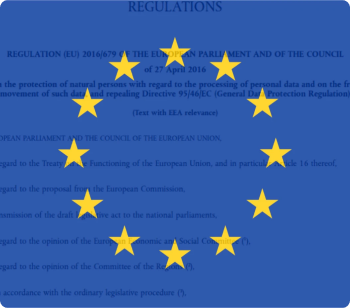| CARVIEW |

ePrivacy Regulation
The ePrivacy Directive (Directive 2002/58/EC), also nicknamed the “Cookie Directive” because of its rules on storing and accessing data on a users’ device, such as so-called Internet cookies, is a directive primarily regulating the processing of personal data in the electronic communications sector, i.e. by telecommunications providers.
The ePrivacy Directive (ePD) is essential to the digital advertising industry because of its rules on cookies. Cookies play an important role in websites delivering a personalised experience, including relevant advertising. The ePrivacy Directive stipulates that member states must create rules that require website operators to inform the user concerned about the use of cookies and obtain their consent to use (most) cookies.
The Commission wanted to repeal and replace the Directive with an ePrivacy Regulation, therefore, the ePrivacy Regulation was published by the European Commission on 10 January 2017. IAB Europe released its first position paper on the proposal for an ePrivacy Regulation on 13 July 2017 and its latest in April 2021.
As a matter of EU law, Regulations can be relied upon directly by citizens, meaning that the EU Member States no longer have a role in interpreting its application to fit within their national legal order.
At the European Parliament, the Committee in charge of the file is the LIBE Committee and its shadow rapporteur is MEP Birgit Sippel from S&D. Following the ordinary legislative procedure for this file, the European Parliament (EP) adopted its report in October 2017.
On 10 February 2021, the Council of the EU signed off on its version of the ePrivacy Regulation, marking the beginning of negotiations with the European Parliament on the final text of the Regulation. The agreement constitutes a significant milestone toward getting an updated regulation in place.
Whereas, the current form proposed Regulation does no longer include the text that would mandate browsers and other software providers to provide the option to prevent data collection through cookies et al. actively and to force users to choose as to their privacy preferences during installation. The absence of this provision (Article 10) may still be obfuscated by similar language in the Council text, which in practice reinstates the removed Article 10 provision.
The proposal has also been an opportunity for the European Parliament to try to include consent as a condition for accessing a service. The European Council adopted a very opposite position by recognising the rights for ‘services provided in accordance with the freedom of expression and information including for journalistic purposes’. There is a great diversity of ad-funded content and outlets made available to users and submit that all online media are primarily financed through advertising. This underscores the importance of so-called conditionality for the continued sustainability of online media businesses.
For more information on the political and legal aspects of the proposal, check out IAB Europe’s ‘Cookie Regulation FAQ’, along with IAB Europe’s (updated: April 2021) position paper on the proposed ePrivacy regulation below.
Q: What is the ePrivacy Regulation?
Q: How will the consent rule change under the ePrivacy Regulation?
Q: Are there any exceptions to this rule?
Q: What else is new under the ePrivacy Regulation?
Q: When will this become law? How does the lawmaking process work?
Q: What’s a trilogue negotiation?
Q: Who gets to have a say during the legislative process?
Q:When can we expect the co-legislators to reach a compromise? Are there any deadlines that have to be met?
Policy, Regulation & Advocacy
European Digital Policy
Digital Services Act
Q: How will the consent rule change under the ePrivacy Regulation?
Q: Are there any exceptions to this rule?
Q: What else is new under the ePrivacy Regulation?
Q: When will this become law? How does the lawmaking process work?
Q: What’s a trilogue negotiation?
For this reason, the representatives of the co-legislators meet with representatives from the Commission informally to agree before this part of the process.
Q: Who gets to have a say during the legislative process?
The Committee on Internal Market and Consumer Protection (IMCO), the Committee on Industry, Research and Energy (ITRE), and the Committee on Legal Affairs (JURI) will contribute to the lead committee’s work with non-binding opinions. Despite being non-binding, ideas suggested in these opinions can be taken over by the rapporteur of the legislative report.
In the Council, the proposal will be dealt with by the Working Party on Telecommunications and Information Society (TELECOM) and ultimately voted on by national ministers in the Transport, Telecommunications and Energy Council configuration.
Q:When can we expect the co-legislators to reach a compromise? Are there any deadlines that have to be met?
As explained above, there are no official deadlines until both co-legislators have held their first formal vote on a draft law in the ordinary legislative procedure. Once an informal agreement has been reached, it still takes time for the law to be drawn up in each of the languages, and for the co-legislators to formally vote on the law. This process took almost half a year for the GDPR. Realistically, the negotiations on the ePrivacy Regulation would have to be done and dusted by the end of 2017 if the deadline proposed by the Commission were to be met.

Features
Sign up for our newsletter
Privacy Overview
| Cookie | Duration | Description |
|---|---|---|
| __cf_bm | 30 minutes | This cookie, set by Cloudflare, is used to support Cloudflare Bot Management. |
| cookielawinfo-checkbox-analytics | 11 months | This cookie is set by GDPR Cookie Consent plugin. The cookie is used to store the user consent for the cookies in the category "Analytics". |
| cookielawinfo-checkbox-functional | 11 months | The cookie is set by GDPR cookie consent to record the user consent for the cookies in the category "Functional". |
| cookielawinfo-checkbox-necessary | 11 months | This cookie is set by GDPR Cookie Consent plugin. The cookies is used to store the user consent for the cookies in the category "Necessary". |
| cookielawinfo-checkbox-others | 11 months | This cookie is set by GDPR Cookie Consent plugin. The cookie is used to store the user consent for the cookies in the category "Other. |
| cookielawinfo-checkbox-performance | 11 months | This cookie is set by GDPR Cookie Consent plugin. The cookie is used to store the user consent for the cookies in the category "Performance". |
| CookieLawInfoConsent | 1 year | CookieYes sets this cookie to record the default button state of the corresponding category and the status of CCPA. It works only in coordination with the primary cookie. |
| viewed_cookie_policy | 11 months | The cookie is set by the GDPR Cookie Consent plugin and is used to store whether or not user has consented to the use of cookies. It does not store any personal data. |
| Cookie | Duration | Description |
|---|---|---|
| _pk_id.1.be1c | 1 year 27 days | Matomo Analytics |
| _pk_ses.1.be1c | 30 minutes | Matomo Analytics |
| browser_id | 5 years | This cookie is used for identifying the visitor browser on re-visit to the website. |




